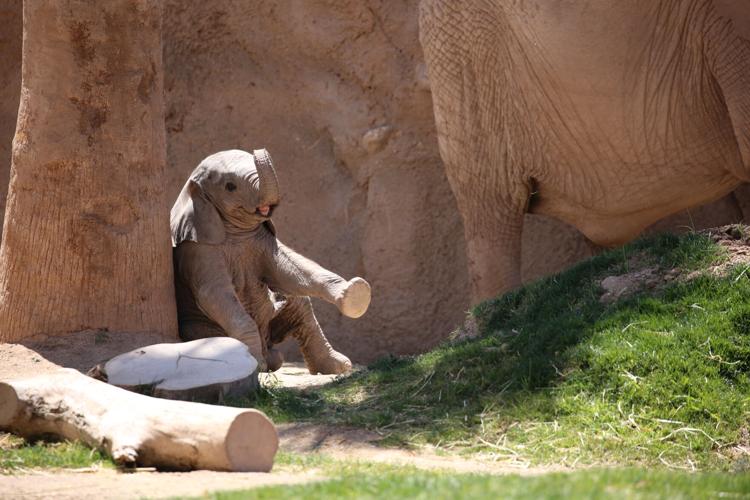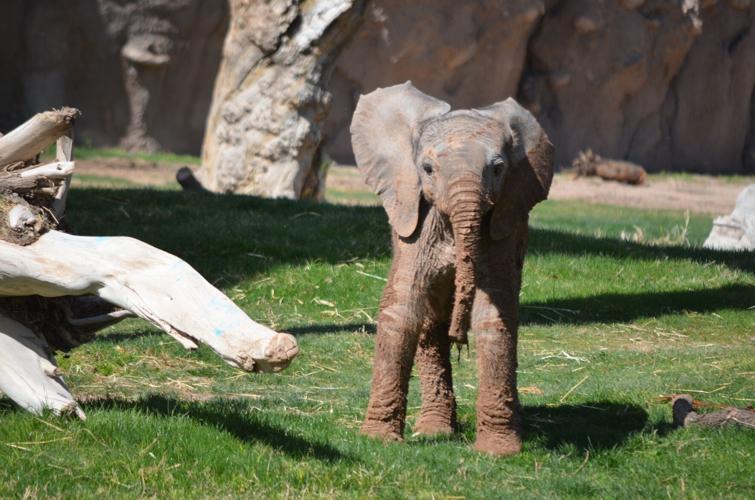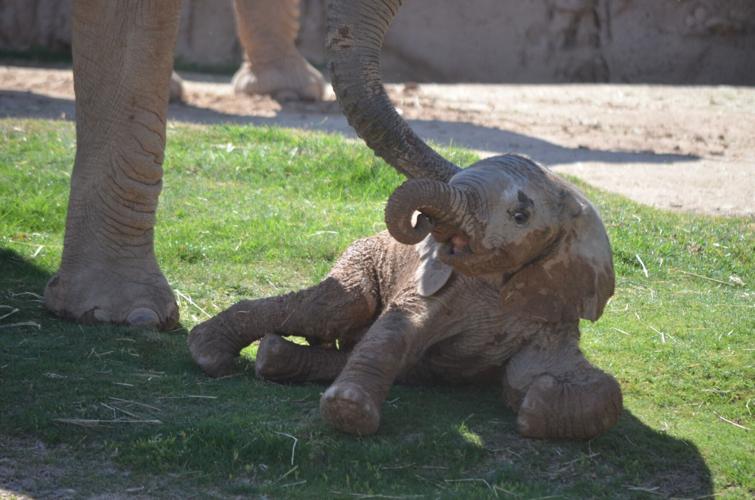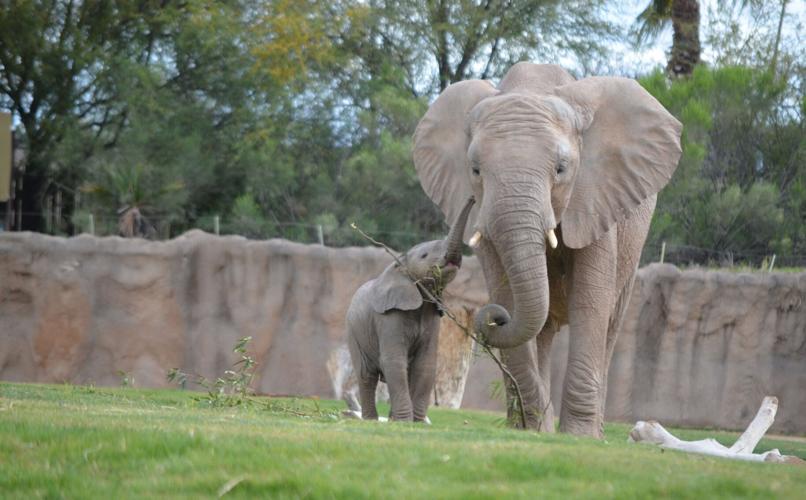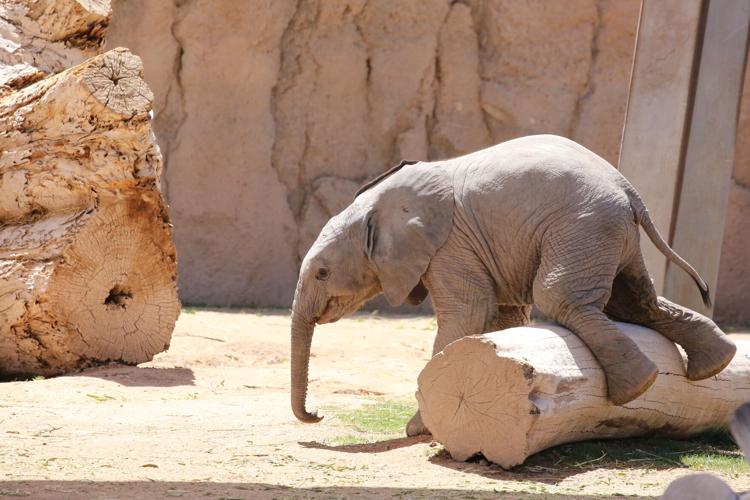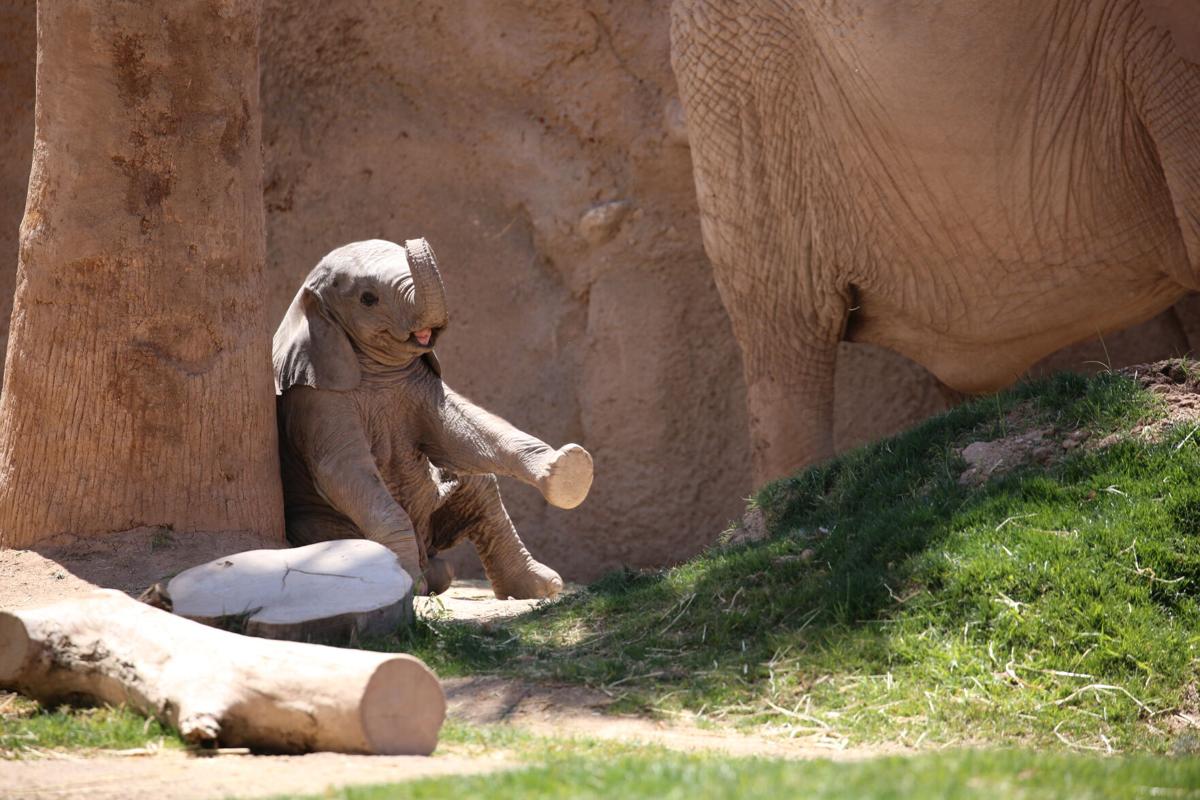Cassie Dodds has watched three elephants grow up.
First it was Nandi, who was the first elephant born in Arizona in 2014. Then it was Penzi, a bundle of joy when she was born at the start of the pandemic in 2020. Now it’s the yet-to-be-named calf who was born on March 8. All three were born to 32-year-old mom Semba.
“All of the calves are definitely different from each other,” says Dodds, who is the elephant supervisor at Reid Park Zoo, 3400 E. Zoo Court. “They all have their own personalities and their own ways of experiencing — and experimenting — their own environment.”
Reid Park Zoo’s big baby is officially 1 month old, tipping the scale at 343 pounds. From her foot to her shoulder, she’s three feet tall.
“She has really playful energy. This calf is really enthusiastic about using her body,” Dodds says. “She wants to climb on things, she wants to try to climb over things. She’s really excited about playing with big logs and trying to climb over them one way and back across another way.”
Reid Park Zoo's big baby turned 1 month old on April 8. She's been enjoying the rain, playing with sister Nandi and exploring her habitat.
The baby has loved Tucson’s rainy days. Though the zoo team has kept the pools shallow because elephants aren’t great swimmers from the start, the calf has been getting into the mud and splashing in the water.
She also likes to play on the small hills in the habitat, learning all about gravity.
“She’s learning if she lays down and her feet are uphill, she has a hard time getting back up,” Dodds says. “There was a day a couple weeks ago she got her feet uphill and she was spinning her little feet and Semba was peacefully eating next to her. After a couple minutes, Semba took her trunk and put her upright but she gave her time to figure it out and then helped her out.”

At 1 month old, the baby elephant loves to climb on things and play on the hills in the habitat.
Speaking of Semba — she’s doing well, basking in Tucson’s spring weather and enjoying her time with the rest of the elephant herd, which also includes allomother Lungile.
Big sister Nandi couldn’t be more in love with the baby — though she’s since learned that the baby isn’t hers.
“Nandi is still enamored with this baby. She prioritizes checking on the calf and touches the calf and lets the calf play with her,” Dodds says. “The calf does like climbing on logs and hillsides and she does try to climb a little bit on the other elephants. After a little bit of time, Semba can get tired of this so (the baby) will run over to Nandi.”

Big sister Nandi has taken on a very nurturing role. The baby plays with Nandi whenever mom Semba needs a break.
Penzi hasn’t quite taken on the nurturing role that Nandi has — but she’s getting better.
“I don’t think she’s scared of the baby anymore, but I don’t think she prefers the baby yet,” Dodds says. “I think her unease with the baby has been overridden by her interest to be close to her mom. She will let the calf stand next to her and touch her, but if the calf comes to her straight on, she will try to push her away and spin back a little bit.
“Her interest in being close to them has increased so I think it’s definitely progress,” Dodds says. “She just turned 4 this weekend so she still has the mentality of a young elephant; she doesn’t have that protective instinct yet.”
Right now, the baby gets all her nutrition from nursing. But like a human baby, she loves putting everything in her mouth, including leaves and grass in the habitat. She’s also interested in cucumbers.

The baby elephant is energetic as ever and loves Tucson’s rainy days.
Keepers are starting to work on training the baby, too. Training sessions at Reid Park Zoo are voluntary for the elephants and done through positive reinforcement. Training allows staff members to better evaluate the elephants’ health and well-being.
“She’s been really great at letting us get exams on her, so we’ve been able to touch behind her ears and her mouth,” Dodds says.
The baby is also learning about targets.
“We train the elephants to go to a target, an object, so we can move them around into different positions. We can use that target to lift their trunk high off the ground, or put their ear out so we can inspect it, or lift their feet or turn around. It’s so if we need to see their foot, we don’t have to lift up their foot,” Dodds says. “With how smart they are, it’s a challenge to them to figure out how they’re going to get to the target with the body part we’re looking for and then they get a reward and social interaction with us.”

The baby elephant is still staying close to mom Semba.
While the baby is unnamed, the elephant team is excited for that to change.
“It’s definitely been fun to call her ‘Baby’ but we’re ready to give her a name,” Dodds says.
Reid Park Zoo is holding a poll, allowing community members to name the baby. The poll, linked here, will close 10 a.m. Wednesday, April 17. There are three choices:
- Meru, in honor of Mount Meru in Tanzania
- Zalika, which means "well born" in Swahili
- Zuma, in honor of Nigeria's Zuma rock formation
Penzi is short for Mapenzi, which means “beloved” in Swahili. Nandi is a siSwati name for girls that means “sweet” or “fun” in Zulu.
“It’s hard when you’re coming up with names. We wanted everything to be meaningful,” Dodds says. “We spoke to friends from around the world — from other elephant programs and friends that live in Africa. We had many conversations with people to find something that’s meaningful, not just to us but to people who live in different parts of the world and especially our community.”

At 1 month old, the baby elephant loves to climb on things.
Dodds is excited that the community will be involved — and she loves watching zoo guests see the baby for the first time. The baby can sometimes be seen in the main part of the habitat, though there’s no set schedule.
“I think the thing that has been really great for us is watching the guests as they come to see her, especially now as (Semba and the baby have) moved up closer to the public,” Dodds says. “We watch the calf really closely, but we do watch the guests. Sharing (the elephants’) experiences is really special for us — to see the excitement that people feel for her. It’s our biggest goal to share her experience and also share the experiences of elephants around the world and teach people about elephant conservation and how involved our zoo is through the Tarangire Project.
“I’m hoping we can inspire people to connect with elephants and wildlife,” she says.

Reid Park Zoo’s elephant herd includes mom Semba, sisters Nandi and Penzi, allomother Lungile and the yet-to-be-named calf.


